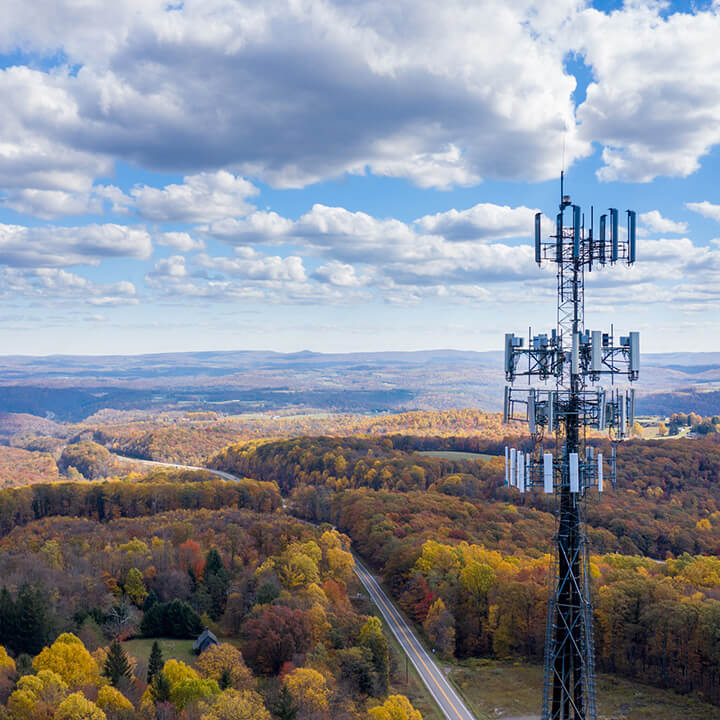How can telecoms equipment burden land? You might want to phone a friend…
5th April 2022
Electronic Communications Code: Commercial context
Advancements in telecommunications technology in recent years have changed the way in which we live and work. Such changes have only been exacerbated by COVID-19. We are now familiar with virtual meetings with colleagues and socialising online with family and friends, but it is likely that few consider the infrastructure that is required to support modern ways of living and working.
Telecommunications companies designated by the industry regulator, Ofcom, (often referred to as operators), facilitate the digital revolution through the installation of telecoms apparatus throughout the country. Telecoms apparatus falls within a special category of regulation and can often benefit from rights afforded by regulations known as the Electronic Communications Code (the Code). The nature of telecoms equipment is wide ranging, from cables and pipes, to structures erected to support such equipment. Code rights can apply to any apparatus which operators use to provide electronic communications services to their customers.
Regulations in this area operate largely in favour of operators, as benefits to the wider digital economy are often deemed to outweigh prejudice to landowners. But what do landowners need to know about Code rights?
Code rights: What landowners need to know
Code rights can benefit telecoms operators throughout the lifetime of their apparatus, from installation to removal. This article summarises some of the more significant rights of which landowners should be aware.
Landowners may agree to permit the installation of telecoms apparatus on their land in exchange for payment. However, where the public benefit of installation outweighs landowner prejudice, operators may install apparatus even without landowner consent, albeit landowner’s should still benefit from compensation in such circumstances.
Once apparatus has been installed, operators may inherit broad rights relating to that equipment including: rights of access to inspect, maintain, or upgrade apparatus; rights to connect to power supplies; and rights to lop or cut back vegetation that may interfere with apparatus and interfere with or obstruct access for the purpose of exercising rights, amongst others. In some circumstances, operators may also upgrade or share their apparatus with other operators without further landowner consent.
Once it is installed, landowners can only require telecoms equipment benefitting from Code rights to be removed in limited circumstances.
What practical implications arise?
Code rights can only be acquired either through agreements in writing which meet specific requirements, or through a court order where operators are seeking to install telecoms apparatus without the landowner’s consent.
Operators often approach landowners with ‘standard form’ documents governing the installation of telecoms apparatus on private land, to facilitate the installation of equipment as quickly as possible in line with their ambitions to expand their networks. It is, however, important for landowners to seek site-specific advice as to how their position can be best protected, before entering into negotiations with operators or completing any deals.
For landowners unsure of their rights with regards to apparatus that is already in situ, the position will depend on when such equipment was installed and how rights relating to the installation were documented.
Code rights can significantly impact the use and value of land. It is particularly important for landowners to understand all code rights affecting their land so as to ensure that any installation arrangement represents a suitable commercial outcome for the landowner, and because such rights bind not only the existing landowner, but also other parties, such as any future occupiers or owners of the site.
How we can help
The installation of telecoms equipment will inevitably continue at a rapid pace as we continue to rely more on communications technology in our daily lives. Against the backdrop that regulations operate in favour of operators from the outset, landowners should approach negotiations with operators with caution and should always seek specialist legal advice. Landowners should fully consider their legal and commercial position in any negotiations and should aim, so far as possible, to ensure the protection of the future use of their land.
Walker Morris’ transactional Real Estate, Infrastructure & Energy and specialist Real Estate Litigation teams are experienced and expert in acting for both landowners and occupiers/operators and will be happy to provide proactive strategic and practical advice in connection with any Code-related agreements and/or negotiations. Our teams are also well-versed in all aspects of alternative dispute resolution, including mediation and arbitration processes, and will be able to help resolve and document any Code-related disputes as and when they do arise.
If you have any queries or concerns in relation to the Code or Code rights affecting land, please do not hesitate to contact Kathryn Brook or Jake Smith in the first instance, for tailored, site-specific advice and assistance.
While we’re on the subject, why not check out our recent briefing on upcoming potential changes to the Code?


